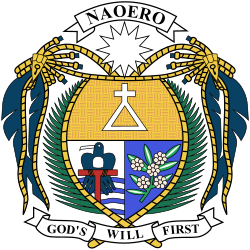This article needs additional citations for verification .(February 2024) |

 |
|---|
The constitution of the Republic of Nauru was adopted following national independence on 31 January 1968. [1] [2]
Contents
In 2007 there were political debates in progress with a view to amend aspects of the Constitution, owing to the challenge of widely acknowledged political instability. One notable issue being discussed was the possibility of making the office of President of Nauru directly elected by the population, instead of the office being indirectly elected by the Parliament of Nauru. Owing to frequent recourse to the votes of no confidence, changes of President have been frequent (i.e.: Bernard Dowiyogo was appointed President of Nauru a total of seven times, prior to his death in 2003). Supporters of making the office of President independent of a Parliamentary vote hope that increased stability will ensure from the adoption of such a measure. Skeptics are concerned that attempts may arise to set aside the elected President through the courts; bearing in mind also that under the Nauruan court system some appeals are actually heard in Australia.